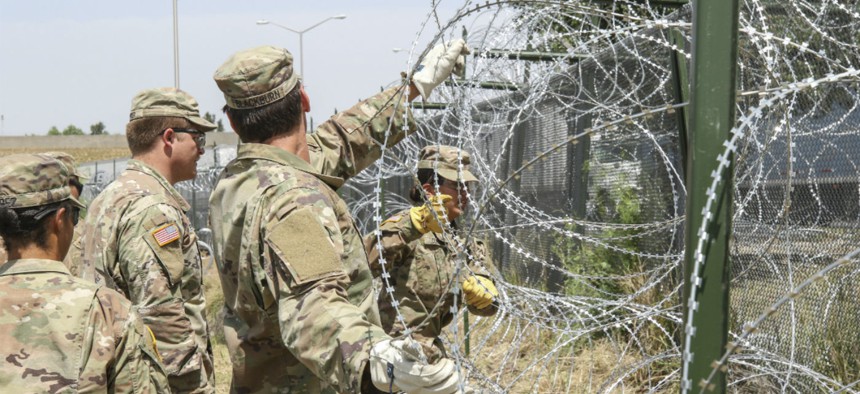
Soldiers from the 161st Engineer Support Company (Airborne) stretch out concertina wire to secure to the existing border fence near the World Trade International Bridge in Laredo, Texas Sgt. Andrew S. Valles/Army
American Military Duties Grow at the Mexico Border
Service members will have permissions that go beyond "observe and report," the Defense Department announced late Monday.
The Pentagon is expanding its supporting tasks on the U.S.-Mexico border, the Defense Department announced late Monday evening. As hinted on Friday, the new taskings will propel service members beyond “observe and report” permissions that were carefully designed to avoid using the military as a domestic law enforcement entity.
The new tasks and numbers include:
- 160 troops who will be “driving high-capacity [Customs and Border Protection] vehicles to transport migrants;”
- 100 more troops for “administrative support” work like cooking and passing out food, building or improving heaters, and “monitoring the welfare of individuals in CBP custody;”
- 20 more troops for “attorney support” to Immigration and Customs Enforcement personnel already in the region.
The tasks are scheduled to run through at least the end of the fiscal year, and cost about $7.4 million, Pentagon spokesman Lt. Col. Jamie Davis said in a Monday statement.
“DoD personnel will not perform any law enforcement functions,” Davis said. “In any situation that requires DoD personnel to be in proximity to migrants, [Homeland Security Department] law enforcement personnel will be present to conduct all custodial and law enforcement functions, and provide force protection of military personnel.” On Friday, the Pentagon refuted a Washington Post report about the U.S. military issuing waivers to troops and soldiers to grant them contact with migrants.
“There is no waiver,” Charlie Summers, the Pentagon’s acting spokesman, told reporters Friday afternoon. “Our policy is the same as it was in 2006 when we had thousands of National Guard troops on the border monitoring and reporting to CBP. I think the issue that maybe you're referring to is we have Border Patrol stations where the CBP is literally overwhelmed with migrants. So we're simple delineating the fact that we will have some of our troops handing out meals, therefore [they] would come in contact with migrants. That's all it is. We're not apprehending anybody,” Summers said. “Our normal practice” when working at the U.S.-Mexico border “is to monitor and report,” he said.
Shanahan’s new “amendment to the policy, would be that our soldiers are able to hand [out] meals in Border Patrol stations that are overwhelmed.”






